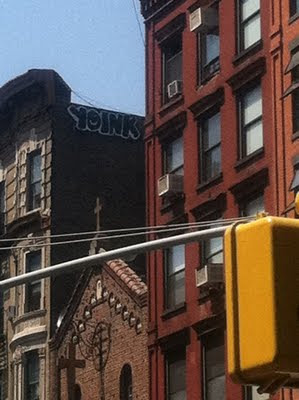 This has been the summer of calamities.
This has been the summer of calamities.
 On the flip, monarchy-less side of that coin, charting the week that was in New York was a harrowing ordeal, perhaps because of its proximity to Toronto, and its proximity to my having lived there only a month ago. Like London, culture is everywhere in NYC, but it’s done differently; no one’s tied down by history (or violently kicking against it) so much as integrating it effortlessly into every day life. Old delis, noodle joints, and dive bars (coming down too quickly) are peppered with old, cracked photographs of celebrities, memories, streets, and faces. It isn’t high art – you can’t buy them. (By contrast, a fast-food joint in west part of Toronto has willfully-worn photos of recent events for sale along its walls for hundreds of dollars.)
On the flip, monarchy-less side of that coin, charting the week that was in New York was a harrowing ordeal, perhaps because of its proximity to Toronto, and its proximity to my having lived there only a month ago. Like London, culture is everywhere in NYC, but it’s done differently; no one’s tied down by history (or violently kicking against it) so much as integrating it effortlessly into every day life. Old delis, noodle joints, and dive bars (coming down too quickly) are peppered with old, cracked photographs of celebrities, memories, streets, and faces. It isn’t high art – you can’t buy them. (By contrast, a fast-food joint in west part of Toronto has willfully-worn photos of recent events for sale along its walls for hundreds of dollars.)  This shrugging, casually f*ck-it attitude, combined with the fiery-eyed ethos of self-determination and truth-or-dare initiative, creates the perfect storm for me to create in. But I don’t like to see the literal perfect storm floating over a place I love -or literal riots. This summer’s series of challenges make me wonder what art -theater, dance, film, music, and visuals -will come out, is being conceived this very moment, has been shaped by calamity and chaos. I’ve been writing non-stop the last few weeks, which explains my lack of posting here. But, with plans afoot to expand, diversify, and cultivate, the calamity and chaos of the summer will, hopefully, lead gracefully into the orderly repose of fall. To quote a favorite song, Everything Must Change.
This shrugging, casually f*ck-it attitude, combined with the fiery-eyed ethos of self-determination and truth-or-dare initiative, creates the perfect storm for me to create in. But I don’t like to see the literal perfect storm floating over a place I love -or literal riots. This summer’s series of challenges make me wonder what art -theater, dance, film, music, and visuals -will come out, is being conceived this very moment, has been shaped by calamity and chaos. I’ve been writing non-stop the last few weeks, which explains my lack of posting here. But, with plans afoot to expand, diversify, and cultivate, the calamity and chaos of the summer will, hopefully, lead gracefully into the orderly repose of fall. To quote a favorite song, Everything Must Change.

